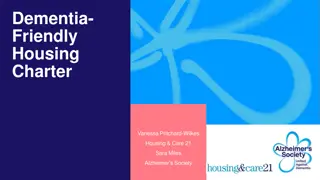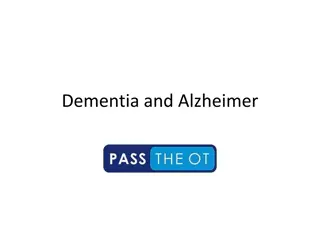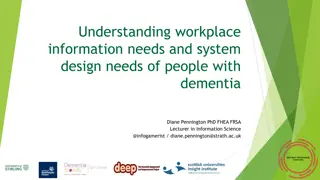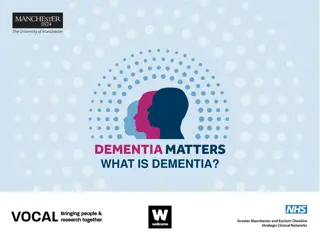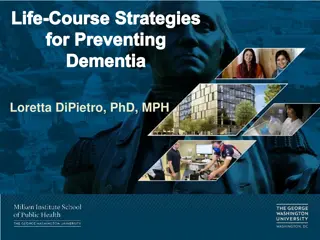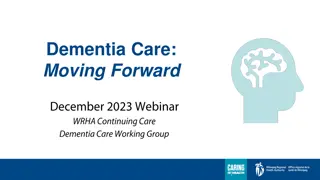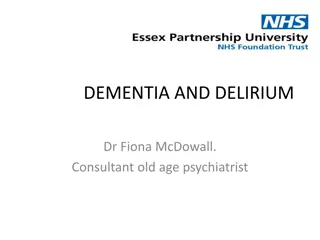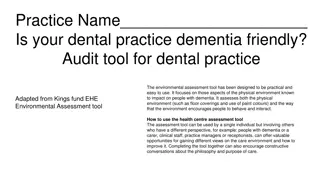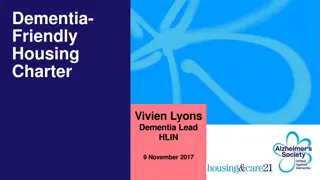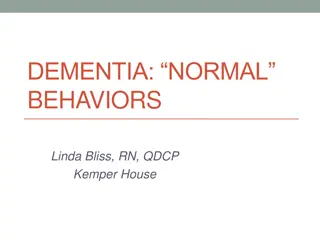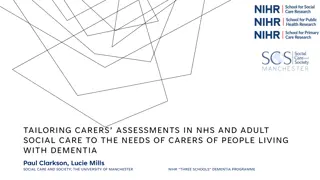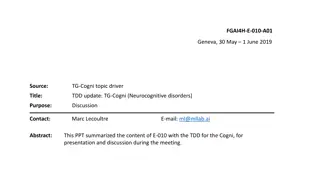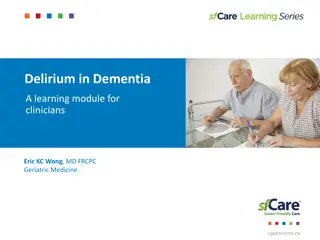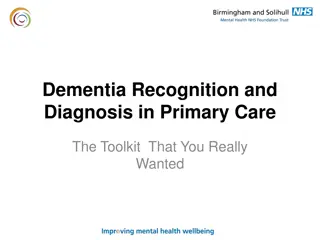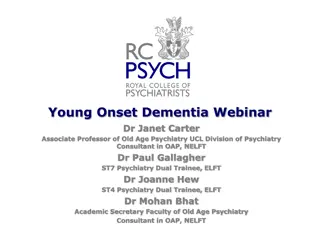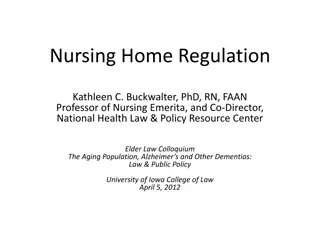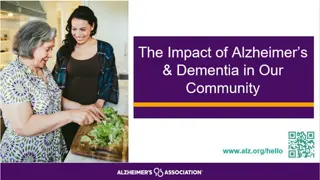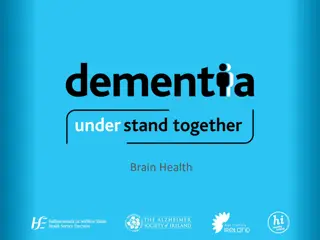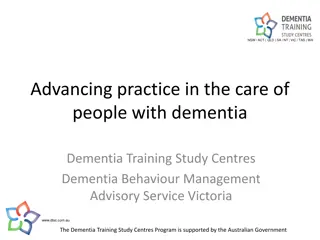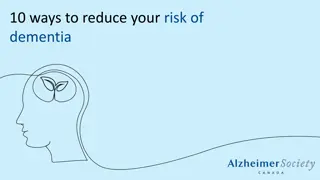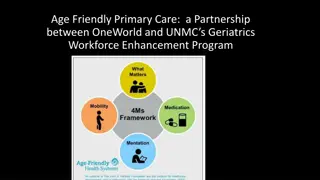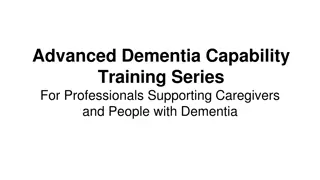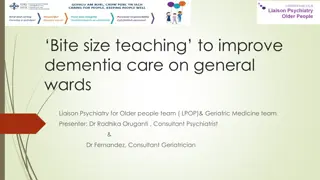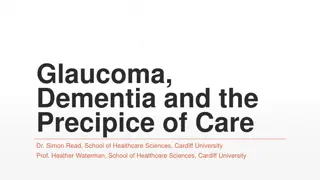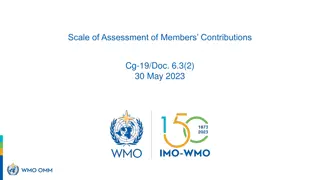Birmingham and Solihull Dementia Summary Strategy 2022-2027 Draft for Engagement
Aimed at enabling individuals with dementia and their caregivers to receive optimal health and social care support, the Birmingham and Solihull Dementia Summary Strategy for 2022-2027 focuses on key priorities: Information, Access, Prevention, and Improving Quality. Addressing national and local contexts, the strategy emphasizes reducing health inequalities, promoting health equity, and implementing the Well Pathway to enhance dementia care across communities.
Download Presentation

Please find below an Image/Link to download the presentation.
The content on the website is provided AS IS for your information and personal use only. It may not be sold, licensed, or shared on other websites without obtaining consent from the author. Download presentation by click this link. If you encounter any issues during the download, it is possible that the publisher has removed the file from their server.
E N D
Presentation Transcript
Birmingham and Solihull Dementia Summary Strategy 2022-2027 Draft for Engagement 6thJune 17thJuly 2022
Aim of the strategy Enable all people with dementia and those who care for them, to have the best possible health and social care support through their dementia journey. Four key priorities 1. Information. To focus on early intervention, prevention and support 2. Access. To a timely diagnosis, access to pre and post diagnostic support 3. Prevention. Of crisis, supporting people with dementia, their carers and communities 4. Improving. Quality of personalised care planning, including end of life
Context Nationally There are currently 850,000 people living with dementia in the UK. This is set to rise to 1.6 million by 2040. National target for diagnosis of dementia is 66.7%, the aim is to increase early diagnosis so support and treatment can be put in place. Locally Current dementia diagnosis rate in Birmingham and Solihull is 57.1%, which is 9.6% low the national rate. By 2040, it is estimated that over 17,000 people with Dementia will be living in Birmingham and Solihull.
Health Inequalities in Birmingham and Solihull Health inequalities are unfair differences in health between our community groups. This has meant some communities have poorer access to information, appropriate services, and planning for end-of-life care. Greater differences identified in communities including homeless, LGBTQIA+, and people with learning disabilities. Aim of Dementia strategy is to tackle health inequalities. Actions going forward Promoting Health Equity In Birmingham and Solihull we have identified greater differences in access to dementia information and services across our communities. Co-production and Engagement There is also stigma attached to being diagnosed with dementia and this can result in people being less likely to seek a formal diagnosis and not being able to access the right services they require. Actions we will take Collaborative Working Education and Training We will work together to enable all of our communities in Birmingham and Solihull to have equity of dementia care. Dementia Equality Impact Assessment (EIA) In all of our identified actions in the dementia strategy we will consider the differences which our communities face and how access can be equitable for all.
Well Pathway The Well Pathway aims to meet needs of all communities along the dementia journey in partnership with councils, UHB, NHS, and third sector colleagues. Preventing well more than 1/3 dementia cases are preventable: brain health intervention plan to raise awareness and mitigate risk factors. Diagnosing well commitment to increase diagnosis rate to 77% (currently 60.1% in Birmingham) with particular attention to reducing inequalities for Asian, Black and marginalised citizens, and citizens with LD. Treating and Supporting well Personalised care and Support Planning for those with dementia and supporting carers, respite opportunities, and reducing anti-psychotic medication. Living well care in community, promoting independence, better staff training. Dying well palliative and end of life care, and advance care planning to give the citizen as much control as possible. 5
Strategy goals Preventing Well Preventing well goals Increase people s knowledge of the ways in which dementia can be prevented. This will reduce the risk of developing dementia and help people recognise dementia earlier. What could this mean to you, I was given information about reducing my risk of getting dementia. Increasing knowledge of the ways dementia can be prevented 1. Increase the awareness of dementia and the importance of early diagnosis 2. Increase people s knowledge of available dementia services and supporting information 3. Increase care professionals knowledge of dementia services and referral pathways post- pandemic 4. Improve access to education and training programmes for people and care professionals 5. nhsbsolccg.dementiastrategy@nhs.net Questions, respond to nhsbsolccg.dementiastrategy@nhs.net Are these the right goals? 1. What would your top three priorities be? 2. 6 Are there any gaps? 3.
Strategy goals Diagnosing Well Diagnosing well: Increase the number of clinically appropriate referrals for memory assessment. It will help people to plan ahead, while they are still able to make important decisions on their care and support needs and on financial and legal matters. It also helps people and their families to receive practical information, advice and guidance as they face new challenges. What this could mean to you, I was diagnosed in a timely way and able to make my own decisions, know what to do to help myself and those who can help me. To increase the number of clinically appropriate referrals for memory assessment. 1. To offer all those referred for a memory assessment pre-diagnostic support information 2. To increase the dementia diagnosis rate in Birmingham and Solihull to meet the national target of 67.7% 3. To offer all individuals diagnosed with dementia access to support services which are personalised to their individual needs 4. Offer all carers / loved ones of those diagnosed with dementia equity in access to support services. Questions, respond to nhsbsolccg.dementiastrategy@nhs.net 5. nhsbsolccg.dementiastrategy@nhs.net Are these the right goals? 1. What would your top three priorities be? 2. 7 Are there any gaps? 3.
Strategy goals Treating and Supporting Well Treating and Supporting Well: Personalised care and Support Planning to include advanced care planning to be made available to all people diagnosed with dementia and offer a clear referral pathway of support once diagnosis is received. What this could mean to you, I am treated with dignity and respect and get the right treatment for my dementia and life. Personalised Care and Support Planning to include advanced care planning for all people diagnosed with dementia. 1. People diagnosed with dementia should have access to medication and non-medication support services to enable them to live well. 2. Pre-diagnostic support information for people and carers, while awaiting a memory assessment. 3. Clear referral pathway for support once diagnosis is received. 4. Post-diagnostic holistic support and signposting for the patient and carers, to include physical, psychological, financial and emotional support. Questions, respond to nhsbsolccg.dementiastrategy@nhs.net 5. nhsbsolccg.dementiastrategy@nhs.net Are these the right goals? 1. What would your top three priorities be? 2. 8 Are there any gaps? 3.
Strategy goals Living Well Living Well: We will take a Strengths based approach to dementia in where we will support to keep people as independent as possible for as long as possible using all the current resources and services available. What this could mean to you, I know those around me, support me in a safe and accepting way and that I feel part of the community. We will take a strengths based approach to support those with dementia, to be independent for as long as possible using all the current resources and services available. 1. nhsbsolccg.dementiastrategy@nhs.net Questions, respond to nhsbsolccg.dementiastrategy@nhs.net Are these the right goals? 1. What would your top three priorities be? 2. 9 Are there any gaps? 3.
Strategy goals Dying Well Dying Well: Patients to be cared for and die in their preferred place with respect and dignity. What this could mean to you, I am confident my wishes will be respected, and I can expect a good death. Patients to be cared for and die in their preferred place with respect and dignity. 1. Increase awareness that Dementia can reduce life expectancy this is a life limiting condition. 2. Planning end of life care should be offered to all those diagnosed with dementia, including a discussion of cardiopulmonary resuscitation (CPR), and to record the patient with involvement where appropriate of their loved ones 3. Promote planning for end of life care whilst the patient can communicate their needs and wishes. 4. nhsbsolccg.dementiastrategy@nhs.net Questions, respond to nhsbsolccg.dementiastrategy@nhs.net Are these the right goals? 1. What would your top three priorities be? 2. 10 Are there any gaps? 3.
Action Plan 2022-2024 The Action Plan uses the Well Pathway to set out what needs to be done to respond to health inequalities for those affected by dementia living within Birmingham and Solihull, which has been made worse by the COVID-19 pandemic. The plan highlights key priorities, actions, outcomes and measures for each stage in the pathway. 1. A review of outcomes and lessons learnt from the 2022 2024 Action Plan will inform the development of the 2024 2027 Action Plan in late 2023. This will mean the refreshed Action Plan will be flexible, innovative and adaptable to the changing dementia care needs over the next 5 years for Birmingham and Solihull s citizens. 2. The main sections that Birmingham City Council have actions for are, Living Well and Supporting Well. Examples of actions include: 3. Confirming Adult Social Care webpages are clear and easy to use for families. Reviewing day opportunities and respite and encouraging uptake of services. Pilot the use of assistive technology in supporting dementia patients in line with the Assistive Technology Strategy. Continue to build links with Neighbourhood Network Scheme to provide prevention/ community support. 11
Next Steps August 2022: Redrafting of the Birmingham and Solihull Dementia Strategy in light of the engagement feedback received. June Late July 2022: Review of the engagement and report collated. July 2022: Engagement with the people and stakeholders of Birmingham and Solihull. 1 2 3 September 2022: Governance Review of Strategy through the ICS to incorporate: ICB; BCC; SMBC. October 2022: Launch of the Birmingham and Solihull Dementia Strategy 2022-27. 4 12
Thank you We value your thoughts, comments and feedback on the draft strategy. Please return any comments to: nhsbsolccg.dementiastrategy@nhs.net nhsbsolccg.dementiastrategy@nhs.net 13




